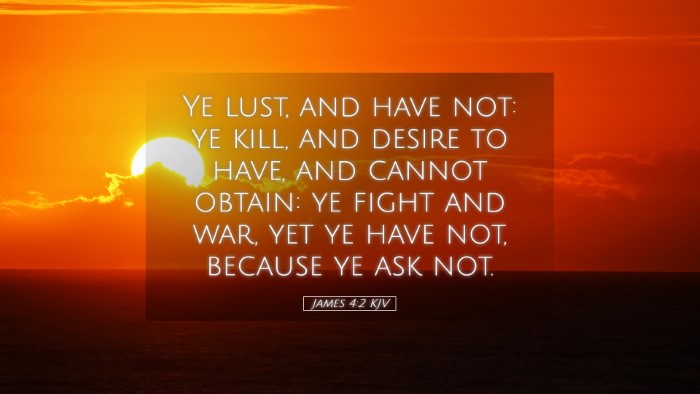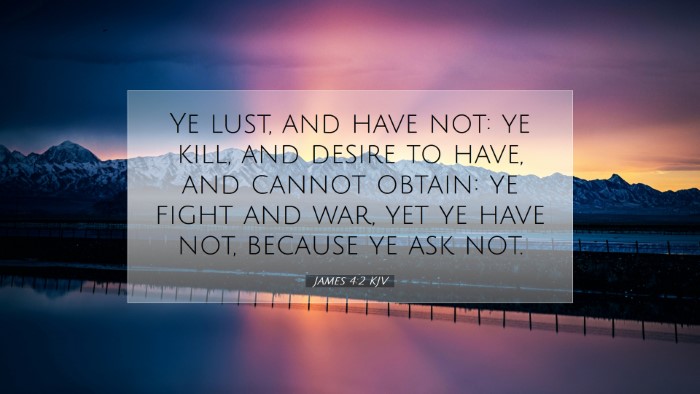Old Testament
Genesis Exodus Leviticus Numbers Deuteronomy Joshua Judges Ruth 1 Samuel 2 Samuel 1 Kings 2 Kings 1 Chronicles 2 Chronicles Ezra Nehemiah Esther Job Psalms Proverbs Ecclesiastes Song of Solomon Isaiah Jeremiah Lamentations Ezekiel Daniel Hosea Joel Amos Obadiah Jonah Micah Nahum Habakkuk Zephaniah Haggai Zechariah MalachiJames 4:2
James 4:2 KJV
Ye lust, and have not: ye kill, and desire to have, and cannot obtain: ye fight and war, yet ye have not, because ye ask not.
James 4:2 Bible Commentary
Commentary on James 4:2
Verse Context: James 4:2 reads: "You desire and do not have; so you murder. You covet and cannot obtain; so you fight and quarrel. You do not have, because you do not ask."
Overview and Themes
This verse encapsulates a critical examination of the human heart and the complex nature of desire and quarrels within the community of believers. The Apostle James confronts the destructive tendencies arising from unfulfilled desires, emphasizing the need for a deeper understanding of prayer and divine provision.
Matthew Henry's Insights
- Desire and Envy: Henry points out that desires can lead to severe consequences, such as violence and strife. When desires go unmet, they not only breed frustration but also can result in aggressive actions toward others.
- Root of Conflict: According to Henry, the quarrels among the early Christians stem from envy and covetousness. He emphasizes that these inner conflicts derail the community’s spiritual unity.
- Prayerless Existence: Henry stresses that the lack of prayer is a significant reason for unmet desires, as many do not ask God for what they need. This absence of prayer leads to a persistent sense of lack.
Albert Barnes' Commentary
- Desire vs. Fulfillment: Barnes emphasizes that unfulfilled desires can take drastic forms, including murder. This indicates a moral decline where unchecked desires manifest in serious actions against others.
- Coveting and Fighting: He elaborates that individuals often fight due to coveting what others possess. James captures the urgency of addressing these interpersonal conflicts that distract from a faith-filled life.
- The Importance of Asking: Barnes highlights the necessity of asking God for our needs. The believers' failure to approach God in prayer reflects a lack of faith and trust in divine provision.
Adam Clarke's Interpretation
- Nature of Human Conflict: Clarke interprets this verse as revealing the essence of human conflict, driven by unfulfilled needs and desires. He suggests that such conflicts are rooted in selfish ambitions.
- Spiritual Ignorance: Clarke notes that the refusal to ask is often indicative of spiritual ignorance or pride. He calls believers to humility in recognizing their need for God.
- The Mechanics of Prayer: He underscores that prayer should be both a pursuit of personal needs and a collective endeavor, emphasizing that true prayer aligns the believer’s will with God’s will.
Theological Reflections
This passage confronts several core theological themes:
- The Nature of Desire: Human desires, when unchecked and not aligned with God's purposes, can lead to destructive behaviors. Believers are called to examine the motives behind their desires.
- Interpersonal Relationships: The communal aspect of faith is emphasized; hence, believers must navigate relationships with caution and love, avoiding the pitfalls of jealousy and strife.
- Role of Prayer: The verse calls for earnest prayer as an essential part of the believer's life. Seeking God’s provision with a humble heart opens pathways to fulfillment and peace.
Practical Applications
For pastors, students, theologians, and scholars, James 4:2 serves as a rich source of guidance:
- Examining Motives: Evaluate personal and communal desires, ensuring they align with God’s will. Encourage congregants to seek God in all matters.
- Promoting Unity: Address conflicts within the church community by fostering open communication and mutual understanding.
- Encouraging Prayer: Teach the importance of prayer as a foundational practice for both personal needs and communal discernment. Lead prayer meetings that focus on collective needs.
Conclusion
James 4:2 compels the church to reflect deeply on the nature of desire, the significance of prayer, and the call to unity. Through engagement with the insights from Matthew Henry, Albert Barnes, and Adam Clarke, believers gain a profound understanding of the spiritual dynamics that influence their lives and relationships. It invites an ongoing dialogue about how to navigate desires in light of faith and community, emphasizing reliance on God in all aspects of life.


